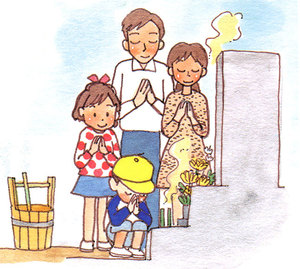

AN IMAGE SHOWING THE ANCESTORS NEAR AS THE PURE LAND IS CLOSE, AND A FAMILY VISITING THE FAMILY GRAVE
In Japan today, it is O-Higan (お彼岸), a holiday in Japanese Buddhism celebrated at the Spring and Fall Equinox. It is said that the etymology of the name, the "other shore", is from "the other shore of the Sanzu River" which river traditionally is said to separate this life from the world of the afterlife, much as the River Hades. The "other shore" can mean as well the world of Enlightenment, which transcends the life and death of this world, this shore. On this day, when the seasons change, the spirits of the dead ancestors are said to be close, and it is a time for communion and remembrance. Many Japanese people will return to their hometowns during the holiday season to pay respects to their ancestors, and Japanese Zen and other Buddhist priests are busy visiting the homes of their temple parishioners to chant for the ancestors in front of the family Buddhist altar.
In our Sangha, we do not follow all the traditional Japanese customs, but today is a reminder of the preciousness of this life. Today, I would like to offer some interpretations of some other traditional Buddhist Teachings, such as images of Rebirth and Karma, Heavens and Hells. Perhaps each was a way to express something important about this life, and this world, that is subtle and hard to understand for most of us, like a lesson eased for a child's ears, more symbol for Truth than itself a literal truth. Perhaps these is something vital pointed to in these Teachings, beyond either believing them exactly or throwing them away. I am a modernist and skeptical of some traditional claims, but I don't believe in tossing the Baby Buddha out with the bathwater either. Not everyone need agree with me.
As with the Japanese customs of O-Higan, they are perspectives to speak to the heart, and to remind us that their is something miraculous about just being alive, about where we "come from and go to" surrounding that time, that there is something important for us to recall in this time we have, that our actions have consequences both for ourself and for this world of others (not two).
In our Sangha this week, some of our members have experienced the birth of children in their family, the death of loved ones, and much unknowing in between. There have been smiles and tears, silliness and fear and cheer and all that can be experienced in life. This life is precious.





Comment